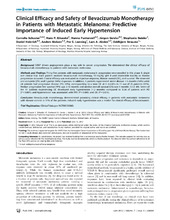Clinical Efficacy and Safety of Bevacizumab Monotherapy in Patients with Metastatic Melanoma: Predictive Importance of Induced Early Hypertension
Schuster, Cornelia; Eikesdal, Hans Petter; Puntervoll, Hanne; Geisler, Jürgen; Geisler, Stephanie; Molven, Anders; Akslen, Lars A.
Peer reviewed, Journal article
Published version
Permanent lenke
https://hdl.handle.net/1956/6486Utgivelsesdato
2012-06-15Metadata
Vis full innførselSamlinger
Originalversjon
https://doi.org/10.1371/journal.pone.0038364Sammendrag
Background: VEGF driven angiogenesis plays a key role in cancer progression. We determined the clinical efficacy of bevacizumab monotherapy in patients with metastatic melanoma. Methods and Findings: Thirty-five patients with metastatic melanoma in progression were enrolled in this phase II, single arm clinical trial. Each patient received bevacizumab monotherapy 10 mg/kg q14 d until intolerable toxicity or disease progression occurred. Clinical efficacy was evaluated as objective response, disease control (DC), and survival. We observed one complete (3%) and 5 partial (14%) responses. In addition, 5 patients experienced stable disease >6 months (14%) while 24 patients had progressive disease (PD, 69%), corresponding to a total DC at 6 months in 11 out of 35 patients (31%). Median progression free survival (PFS) was 2.14 months and median overall survival (OS) was 9 months (1.12–49). Seven of the 11 patients experiencing DC developed early hypertension (<2 months) compared to 3/24 of patients with PD (P = 0.001), and hypertension was associated with PFS (P = 0.005) and OS (P = 0.013). Conclusion: Bevacizumab monotherapy demonstrated promising clinical efficacy in patients with metastatic melanoma with disease control in 31% of the patients. Induced early hypertension was a marker for clinical efficacy of bevacizumab.

